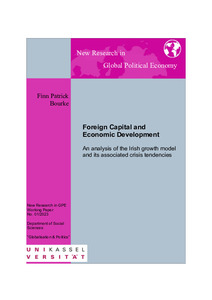Datum
2023-07Autor
Bourke, Finn PatrickSchlagwort
320 Politikwissenschaft IrlandWirtschaftWachstumsmodellWirtschaftskriseNeoliberalismusHegemonieMetadata
Zur Langanzeige
Working paper
Foreign Capital and Economic Development

Foreign Capital and Economic Development
An analysis of the Irish growth model and its associated crisis tendencies
Zusammenfassung
The Irish political economy is notable for the sustained and central role of foreign investment in driving economic growth, notably via the commercial activities of multinational corporations, and more recently financial services. Beginning in the 1950s, the Irish state began to move away from its protectionist policies of import-substituting industrialization, and transitioned towards a liberalized, export-led industrialization model of economic growth in order to achieve its developmental catch-up. This has resulted in the continued influx of foreign capital becoming a key pillar in the state’s strategy to establish Ireland as a competitive, attractive location in the global economy. Yet, despite the clear material advancement and higher overall societal well-being that has ultimately been achieved since the emergence of this broad framework, debates have persisted regarding the extent to which the Irish growth model provides the foundation for sustainable and equitable economic development. In light of this, this paper, taking the Celtic Tiger period and subsequent recovery period as a case study, explores the reasons behind the successful stabilization and reproduction of the Irish growth model. Drawing on regulationist and neo-Gramscian perspectives, and utilizing historical-materialist policy analysis and critical discourse analysis approaches, it investigates both the durability of Irish economic growth driven by foreign investment, and the resilience of neoliberalism in steering both policymaking and public discourse in the Irish state. This study demonstrates that despite the severity of the Irish economic crisis between the late-2000s and early-2010s, Irish neoliberal orthodoxy – understood as neoliberal hegemony – ultimately endured. In explaining this, it points to economic path dependency; the strategies of the political elites and the media; the broader international context; and the lack of viable opposition as key factors in the ultimate stabilization and reproduction of Ireland’s neoliberal, foreign-led model of capitalist development.
Zitieren
@unpublished{doi:10.17170/kobra-202305178037,
author={Bourke, Finn Patrick},
title={Foreign Capital and Economic Development},
year={2023}
}
0500 Oax
0501 Text $btxt$2rdacontent
0502 Computermedien $bc$2rdacarrier
1100 2023$n2023
1500 1/eng
2050 ##0##http://hdl.handle.net/123456789/14911
3000 Bourke, Finn Patrick
4000 Foreign Capital and Economic Development / Bourke, Finn Patrick
4030
4060 Online-Ressource
4085 ##0##=u http://nbn-resolving.de/http://hdl.handle.net/123456789/14911=x R
4204 \$dWorking paper
4170
5550 {{Irland}}
5550 {{Wirtschaft}}
5550 {{Wachstumsmodell}}
5550 {{Wirtschaftskrise}}
5550 {{Neoliberalismus}}
5550 {{Hegemonie}}
7136 ##0##http://hdl.handle.net/123456789/14911
<resource xsi:schemaLocation="http://datacite.org/schema/kernel-2.2 http://schema.datacite.org/meta/kernel-2.2/metadata.xsd"> 2023-07-24T08:19:47Z 2023-07-24T08:19:47Z 2023-07 doi:10.17170/kobra-202305178037 http://hdl.handle.net/123456789/14911 eng Urheberrechtlich geschützt https://rightsstatements.org/page/InC/1.0/ Irish economy growth model foreign capital economic crisis neoliberal hegemony 320 Foreign Capital and Economic Development Working paper The Irish political economy is notable for the sustained and central role of foreign investment in driving economic growth, notably via the commercial activities of multinational corporations, and more recently financial services. Beginning in the 1950s, the Irish state began to move away from its protectionist policies of import-substituting industrialization, and transitioned towards a liberalized, export-led industrialization model of economic growth in order to achieve its developmental catch-up. This has resulted in the continued influx of foreign capital becoming a key pillar in the state’s strategy to establish Ireland as a competitive, attractive location in the global economy. Yet, despite the clear material advancement and higher overall societal well-being that has ultimately been achieved since the emergence of this broad framework, debates have persisted regarding the extent to which the Irish growth model provides the foundation for sustainable and equitable economic development. In light of this, this paper, taking the Celtic Tiger period and subsequent recovery period as a case study, explores the reasons behind the successful stabilization and reproduction of the Irish growth model. Drawing on regulationist and neo-Gramscian perspectives, and utilizing historical-materialist policy analysis and critical discourse analysis approaches, it investigates both the durability of Irish economic growth driven by foreign investment, and the resilience of neoliberalism in steering both policymaking and public discourse in the Irish state. This study demonstrates that despite the severity of the Irish economic crisis between the late-2000s and early-2010s, Irish neoliberal orthodoxy – understood as neoliberal hegemony – ultimately endured. In explaining this, it points to economic path dependency; the strategies of the political elites and the media; the broader international context; and the lack of viable opposition as key factors in the ultimate stabilization and reproduction of Ireland’s neoliberal, foreign-led model of capitalist development. open access Bourke, Finn Patrick v, 90 Seiten Kassel, Universität Kassel, Fachbereich Gesellschaftswissenschaften Irland Wirtschaft Wachstumsmodell Wirtschaftskrise Neoliberalismus Hegemonie An analysis of the Irish growth model and its associated crisis tendencies publishedVersion New Research in Global Political Economy No. 01/2023 false </resource>
Die folgenden Lizenzbestimmungen sind mit dieser Ressource verbunden:
Urheberrechtlich geschützt

